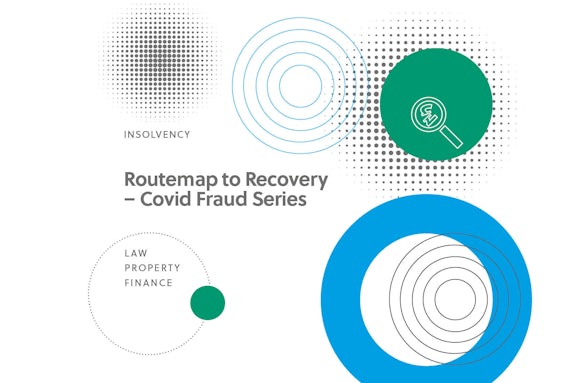Covid Fraud Series – proceeds of crime and reporting requirements for IPs
In this the third and final of our series of fraud related insights for Insolvency Practitioners, we outline what IPs need to be on the lookout for when it comes to proceeds of crime and what we think the next few years will bring for IPs.
The scale of suspected fraud in the Covid business support measure is enormous –Bounce Back Loan fraud alone is estimated at around £5 billion with a further £5.2 billion in furlough fraud.What do IPs need to look out for and what reporting obligations do they have? And what dangers lie ahead for those who get this wrong?
What is fraud?
This seems like a simple question but often people envisage fraud as being restricted to particularly devious behaviour. However, fraud is really very widely defined. It covers circumstances where a practical result is brought about by means of a false pretence. The essential element is deception but that is not limited to telling an overt lie. It can also include omitting or failing to disclose the true position.
It is easy to see how this can come about in the Covid business support measures. Turnover figures may have been “massaged” to obtain higher Bounce Back Loans than the company would otherwise be entitled to or CJRS (furlough) may have been claimed for a period when employees had ceased to work for the employer.
Proceeds of Crime Act offences and obligations
POCA is set up to target “criminal property”. This is very widely defined to encompass property or pecuniary advantage acquired through criminal conduct. Fraudulently obtained loans or grants will be within the definition of criminal property as will assets purchased with the funds.
IPs as part of the regulated sector will need to be wary of a number of possible criminal offences within POCA. These include the offences of acquiring, using or possessing criminal property, concealing or transferring criminal property, and entering into arrangements to facilitate the acquisition, retention, use or control of criminal property. In addition, there are offences for the failure to disclose knowledge or suspicion of money laundering to your Money Laundering Reporting Officer and the National Crime Agency, or for tipping off a client by letting them know that a disclosure has been made.
For IPs, it is not uncommon that taking an appointment may result in dealing with criminal property. What can be done then if the IP knows or suspects that a company has assets obtained through Covid fraud? The solution is to submit a Suspicious Activity Report (SAR) and request a defence against money laundering (DAML). This is a request to obtain permission to deal with assets obtained through criminal conduct.
SARs are submitted to the National Crime Agency and need to be carefully completed to ensure sufficient information is provided so that the NCA can make a decision on whether to grant a DAML. Usually the NCA has 7 days within which to take a decision on issuing a DAML but since August 2021, an accelerated route has been opened up for IPs as the NCA recognises that IPs may have to take decisions on taking appointments within a much shorter time frame. The IP route to the NCA tries to turn around SAR and DAML requests within 24 hours but is only to be used for urgent situations.
IPs are advised to seek a DAML in advance of taking the appointment if possible. The NCA can grant DAMLs of up to 12 months duration to cover payments and distributions to creditors and third parties that have had nothing to do with the criminal conduct. However, IPs will need to keep an eye on the extent of the DAML and subsequent DAMLs or ones for specific situations may need to be sought in addition.
Given the prevalence of Covid business support fraud, IPs will be well advised to be mindful of their obligations under POCA and to consider if a report needs to be made and DAML sought as part of the process of deciding whether to take an appointment. In short, getting this wrong can result in no ability to pay fees and worse jail time… both of which are serious! Your MLRO may want to provide some updated internal training on these issues, and particularly given the recent restrictions on Russian funds and funders, and we are of course happy to chat through this with any contacts on our Routemap to Recovery series mailing list.
If you want to join our Insolvency mailing list please contact us here
Should you have any questions on any of the articles in this series please contact:
Eilidh MacEwan by email: emacewan@gilsongray.co.uk or by phone: 0131 285 1809 / 07376 192 463.
Steven Jansch by email: sjansch@gilsongray.co.uk or by phone: 0131 516 5361 / 07841 920 100.
Craig Darling by email: cdarling@gilsongray.co.uk or by phone: 0141 530 2044/07841 920 467
You can visit our dedicated Insolvency page here
The information and opinions contained in this blog are for information only. They are not intended to constitute advice and should not be relied upon or considered as a replacement for advice. Before acting on any of the information contained in this blog, please seek specific advice from Gilson Gray







